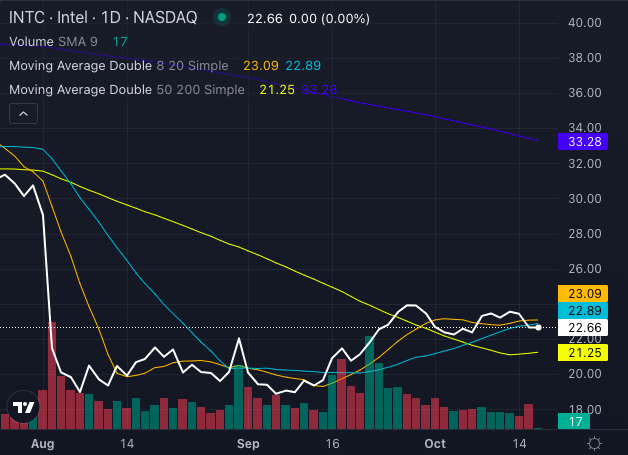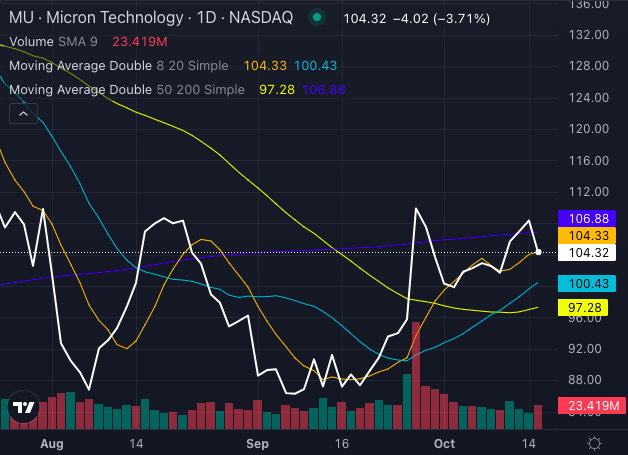Intel Vs. Micron Technology: Which Chipmaker Holds The Edge?
Intel Corp. (NASDAQ:INTC) and Micron Technology Inc. (NASDAQ:MU) are going head-to-head in the semiconductor arena, but it looks like the battle lines are drawn in more than just the stock charts.
Both companies have had their fair share of headlines, innovations, and hurdles in recent weeks.
While Intel's partnerships and global challenges pile up, Micron is racing ahead with cutting-edge memory solutions and expansion into new markets. But who's really winning the chip war?
Let's dive into a head-to-head comparison of these two tech titans.
Intel: Navigating Complex Partnerships & Geopolitical Roadblocks
Intel's year has been rough, with the stock tumbling over 52% year-to-date and down 38% over the past year.
But if you think this chip giant is ready to surrender, think again. Intel has been busy forming alliances to future-proof its business. Its latest partnership with Advanced Micro Devices Inc (NASDAQ:AMD) to create the x86 Ecosystem Advisory Group shows it's serious about shaping the future of computing architecture.
This collaboration includes big names like Alphabet Inc‘s Google Cloud, Dell Technologies Inc, and Microsoft Corp, aiming to keep Intel and AMD at the forefront of the evolving tech landscape.
But Intel's challenges go beyond just innovation. The company faces increasing scrutiny from China, which recently flagged Intel's products for security reviews, accusing the U.S. chipmaker of harming national security, according to Reuters. Meanwhile, Qualcomm Inc's (NASDAQ:QCOM) potential acquisition of Intel is now being held up by both U.S. elections and Chinese scrutiny, leaving investors uncertain.
Analysts aren't exactly optimistic either. Deutsche Bank, Mizuho, and Rosenblatt all have price targets, implying Intel could see further downside.

Chart created using Benzinga Pro
And with the stock hovering around $22.66, well below its 200-day SMA of $33.28, the technicals suggest Intel might be in for more pain.
Its price has slipped below its eight and 20-day moving averages, signaling short-term bearish momentum.
Read Also: Nvidia and Intel Competition Threaten AMD’s Growth, Analyst Says
Micron: Betting Big On Memory & AI
In stark contrast to Intel's struggles, Micron is riding a wave of momentum.
The stock is up a whopping 26.69% year-to-date and an impressive 51% over the past year. Micron's secret weapon?
A relentless focus on next-gen memory technologies, which are critical for AI and high-performance computing. The company recently launched its DDR5 CUDIMM and CSODIMM solutions, which boast speeds of up to 6,400 MT/s, making it the first to market with JEDEC-standard clock driver-based memory modules. Micron's innovative memory products are set to supercharge AI PCs and high-end workstations, putting the company in the driver's seat for future AI workloads.
What's more, Micron is making a major push into India with the construction of a new Assembly, Testing, Marking, and Packaging (ATMP) facility in Gujarat, signaling its commitment to expanding its global footprint. India is set to play a key role in Micron's long-term strategy, further separating it from competitors like Intel, who are grappling with geopolitical roadblocks.
On the technical front, Micron looks much healthier than Intel.

Chart created using Benzinga Pro
Its share price of $104.32 is above its 20 and 50-day SMAs, signaling a strong bullish trend. However, its eight-day and 200-day SMAs sit slightly higher at $104.33 and $106.88, respectively, suggesting some caution may be needed in the longer term.
Still, with a Buy consensus rating and an average price target of $145.36, analysts see significant upside for Micron, with an implied 38.60% increase from current levels.
The Verdict: Innovation Vs. Headwinds
While Intel grapples with partnerships, political scrutiny, and lackluster stock performance, Micron is charging ahead with groundbreaking technology and global expansion.
Investors looking for short-term gains may find Micron more appealing. The company is riding the AI wave and innovating rapidly.
Intel, on the other hand, may require a longer-term horizon, as its partnerships with AMD and other tech giants could bear fruit in shaping the future of computing—assuming it can navigate the geopolitical minefield.
In this chipmaker showdown, Micron seems to have the upper hand in the battle for AI dominance, while Intel might need to wait for its partnerships and political uncertainties to clear before reclaiming its crown.
Read Next:
Photo: Shutterstock
 Index Options
Index Options CME Group
CME Group Nasdaq
Nasdaq Cboe
Cboe TradingView
TradingView Wall Street Journal
Wall Street Journal